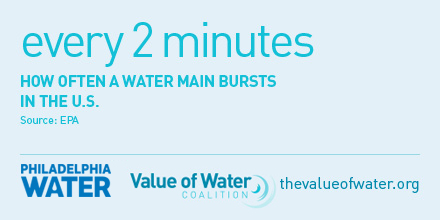
This graphic, produced by Value of Water, shows we aren't alone in dealing with main breaks. Over the last 5 years, Philadelphia Water averaged 823 water main breaks per year, a fairly typical number for similar cities. Credit: Philadelphia Water/Value of Water.
As a part of the national "Imagine a Day Without Water" campaign, City Council backed a resolution recognizing the importance of our water infrastructure and the need for both local and federal investment to maintain the pipes and systems that deliver, remove and treat our water.
We're thrilled that Philly's elected officials (officially) get just how important it is to keep our water flowing! In the Tuesday, Oct. 1 session, City Council overwhelmingly approved the resolution. You can view the document here, and we've included the full text below.
MORE: Read Philadelphia Water Commissioner Howard Neukrug's Inquirer Op-Ed Here
Since there are roughly 2,000 employees at Philadelphia Water working 24/7/365 to make sure you always have clean, safe drinking water and that our rivers are protected and healthy, we know the importance of having water. And even just one day without water would more than inconvenient—it could be catastrophic.
It's more than brushing your teeth, having a cup of coffee and, of course, staying hydrated. So much—from the food we grow to our power plants and life-saving fire hydrants—depends on the nation's water infrastructure. And yet, we often take it for granted until something breaks because so much of this crucial system is hidden beneath our feet. In Philadelphia alone, there are enough pipes and sewers to stretch from here to California and back again, and much of that system is aging.
We've budgeted $767 million in 2016 to keep Philadelphia's water infrastructure running, but the system is still aging, and costs will rise.
That's why we're part of the "Imagine a Day Without Water" campaign, organized by the national Value of Water Coalition, to raise awareness about the need for infrastructure investment.
Learn more about this important issue at the Value of Water website, check out City Council's resolution below, and be sure to keep read an important message from Philadelphia Water Commissioner Howard Neukrug and former Pa. Governor Ed Rendell (now co-chair at Building America's Future) on the Philadelphia Inquirer's opinion page.
City Council’s Imagine a Day Without Water Resolution - Full Text:
Recognizing the Philadelphia Water Department and the “Imagine a Day Without Water” campaign being held October 6-8 2015 which is geared toward recognizing the importance of clean water in our lives and the investment in infrastructure that is necessary to protect this valuable resource.
Whereas, the infrastructure that brings water to and from homes and businesses is essential to the quality of life and economic vitality of the city of Philadelphia; and
Whereas, Philadelphia residents on average utilize 87 gallons of water per person, per day; and
Whereas, Philadelphia has almost 3,200 miles of water mains with an average age of 70 years; and treats over 250 million gallons of drinking water per day and over 471 million gallons of wastewater and stormwater per day, providing reliable and clean water to over 2 million people; and
Whereas, while utilities nationwide are grappling with aging infrastructure, Philadelphia Water is making prudent and sustainable investments guided by a 10-year capital plan; and
Whereas, Philadelphia Water has been a model for innovation, delivering notable projects such as the Contaminant Warning System and the Biogas Cogeneration facility; and
Whereas, Philadelphia will invest $2 billion over 25 years in its Green Cities, Clean Water program to ensure clean water and an ever-greener Philadelphia for present and future generations; and
Whereas, green stormwater infrastructure will not only ease the burden on our sewers but will provide a maximum return in benefits to the public, the economy and the environment; and
Whereas, one-fifth of the U.S. economy would grind to a halt without a reliable and clean source of water; and
Whereas, for every one job created in the water sector, another 3.68 jobs are added in the national economy. And for every $1 spent on infrastructure improvements, the U.S .generates $6 in returns; now; therefore, be it
RESOLVED, BY THE COUNCIL OF THE CITY OF PHILADELPHIA, that the City of Philadelphia recognizes that water is essential to the quality of life and economic competitiveness and acknowledges the importance of educating the public about the value of water through the “Imagine A Day Without Water” campaign.
FURTHER RESOLVED , that the City of Philadelphia is dedicated to investing in the City’s water and wastewater infrastructure and calls on our federal partners to bring much-needed funding to Philadelphia to protect and restore our critical water infrastructure.